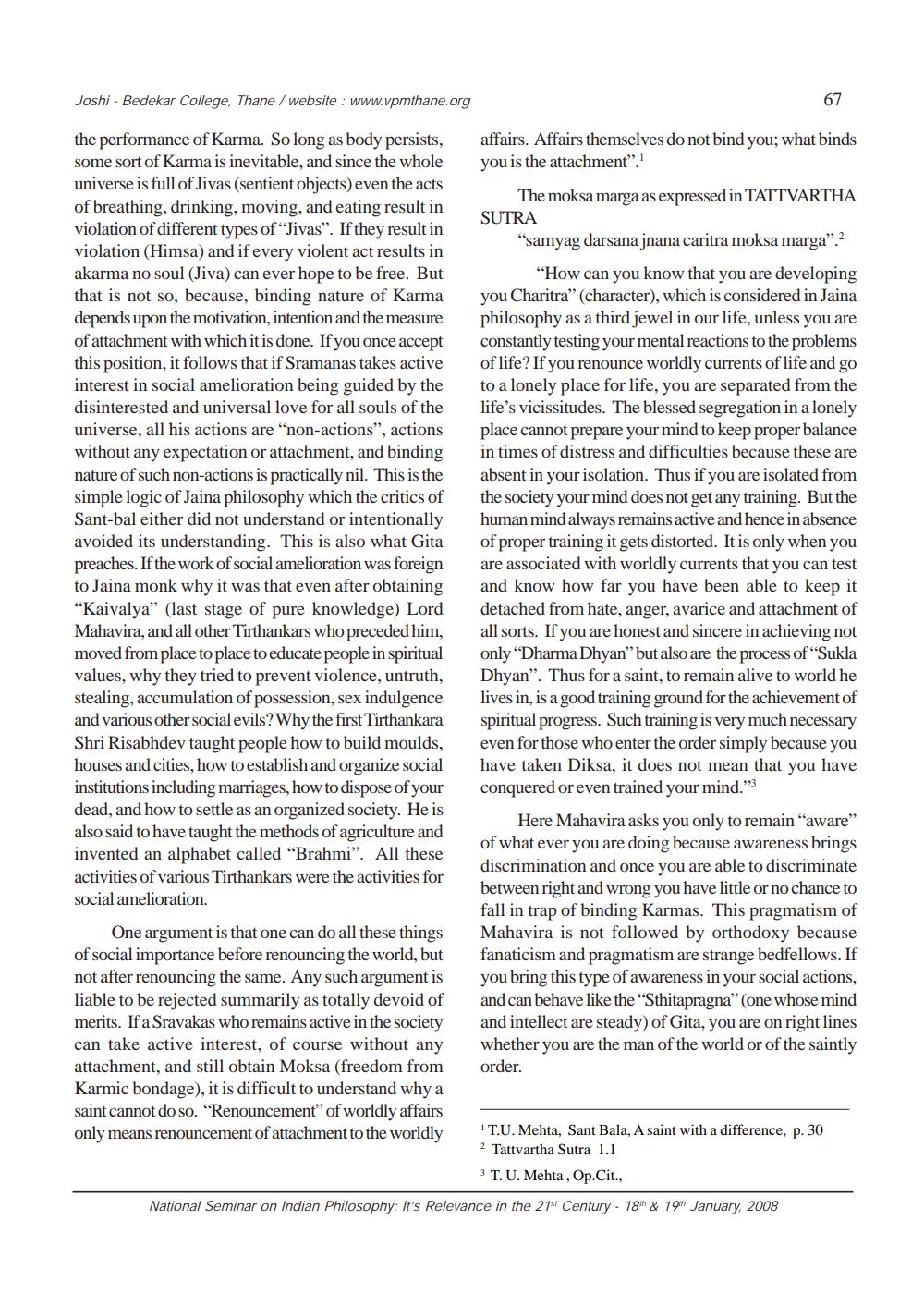Book Title: Indian Philosophy in 21st Century Jaina View Author(s): Kamini Gogri Publisher: Kamini Gogri View full book textPage 2
________________ Joshi - Bedekar College, Thane / website : www.vpmthane.org 67 affairs. Affairs themselves do not bind you; what binds you is the attachment".! the performance of Karma. So long as body persists, some sort of Karma is inevitable, and since the whole universe is full of Jivas (sentient objects) even the acts of breathing, drinking, moving, and eating result in violation of different types of "Jivas". If they result in violation (Himsa) and if every violent act results in akarma no soul (Jiva) can ever hope to be free. But that is not so, because, binding nature of Karma depends upon the motivation, intention and the measure of attachment with which it is done. If you once accept this position, it follows that if Sramanas takes active interest in social amelioration being guided by the disinterested and universal love for all souls of the universe, all his actions are "non-actions", actions without any expectation or attachment, and binding nature of such non-actions is practically nil. This is the simple logic of Jaina philosophy which the critics of Sant-bal either did not understand or intentionally avoided its understanding. This is also what Gita preaches. If the work of social amelioration was foreign to Jaina monk why it was that even after obtaining "Kaivalya" (last stage of pure knowledge) Lord Mahavira, and all other Tirthankars who preceded him, moved from place to place to educate people in spiritual values, why they tried to prevent violence, untruth, stealing, accumulation of possession, sex indulgence and various other social evils? Why the first Tirthankara Shri Risabhdev taught people how to build moulds, houses and cities, how to establish and organize social institutions including marriages, how to dispose of your dead, and how to settle as an organized society. He is also said to have taught the methods of agriculture and invented an alphabet called "Brahmi". All these activities of various Tirthankars were the activities for social amelioration. One argument is that one can do all these things of social importance before renouncing the world, but not after renouncing the same. Any such argument is liable to be rejected summarily as totally devoid of merits. If a Sravakas who remains active in the society can take active interest, of course without any attachment, and still obtain Moksa (freedom from Karmic bondage), it is difficult to understand why a saint cannot do so. "Renouncement" of worldly affairs only means renouncement of attachment to the worldly The moksa marga as expressed in TATTVARTHA SUTRA "samyag darsana jnana caritra moksa marga".2 “How can you know that you are developing you Charitra" (character), which is considered in Jaina philosophy as a third jewel in our life, unless you are constantly testing your mental reactions to the problems of life? If you renounce worldly currents of life and go to a lonely place for life, you are separated from the life's vicissitudes. The blessed segregation in a lonely place cannot prepare your mind to keep proper balance in times of distress and difficulties because these are absent in your isolation. Thus if you are isolated from the society your mind does not get any training. But the human mind always remains active and hence in absence of proper training it gets distorted. It is only when you are associated with worldly currents that you can test and know how far you have been able to keep it detached from hate, anger, avarice and attachment of all sorts. If you are honest and sincere in achieving not only “Dharma Dhyan" but also are the process of “Sukla Dhyan". Thus for a saint, to remain alive to world he lives in, is a good training ground for the achievement of spiritual progress. Such training is very much necessary even for those who enter the order simply because you have taken Diksa, it does not mean that you have conquered or even trained your mind." Here Mahavira asks you only to remain "aware" of what ever you are doing because awareness brings discrimination and once you are able to discriminate between right and wrong you have little or no chance to fall in trap of binding Karmas. This pragmatism of Mahavira is not followed by orthodoxy because fanaticism and pragmatism are strange bedfellows. If you bring this type of awareness in your social actions, and can behave like the "Sthitapragna" (one whose mind and intellect are steady) of Gita, you are on right lines whether you are the man of the world or of the saintly order. T.U.Mehta, Sant Bala, A saint with a difference, p. 30 2 Tattvartha Sutra 1.1 3 T. U. Mehta, Op.cit., National Seminar on Indian Philosophy: It's Relevance in the 21st Century - 18 & 19 January, 2008Page Navigation
1 2 3 4
